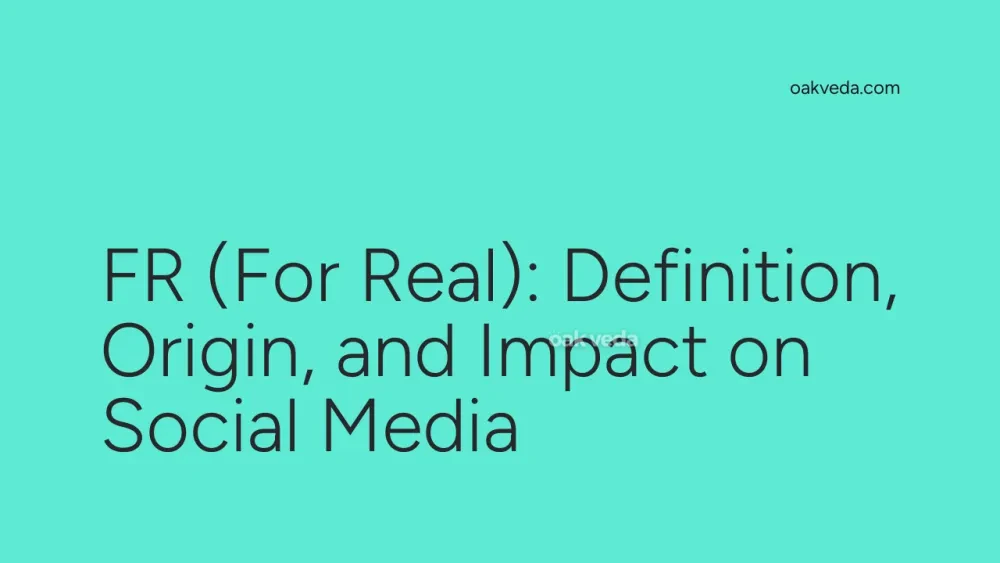
What is FR?
FR is an acronym that stands for "For Real" in social media and online communication. It's a popular slang term used to express agreement, confirmation, or sincerity in digital conversations. FR has become an integral part of internet language, particularly among younger generations who frequently use it on various social media platforms.
Origin and Development of FR
The term "for real" originates from African American Vernacular English (AAVE) and has been used in spoken language for decades. However, its abbreviated form "FR" gained widespread popularity as an internet slang term in the early 2020s. The rise of short-form content platforms like TikTok and Twitter, which encourage concise communication, contributed significantly to the proliferation of acronyms like FR.
How FR Works
FR is typically used in two main ways:
-
Agreement or Confirmation: Users often employ FR to emphasize their agreement with a statement or to confirm the truth of something. For example:
- Person A: "This new album is fire!"
- Person B: "FR! I can't stop listening to it."
-
Expressing Sincerity: FR can be used to convey that the speaker is being genuine or serious about what they're saying. For instance:
- "FR, I'm sorry for what I said earlier. I didn't mean to hurt your feelings."
Popular Examples of FR
FR has become ubiquitous across various social media platforms. Here are some common ways it's used:
- On Twitter: "The weather is crazy today, FR"
- In Instagram comments: "You look amazing in this pic, FR!"
- In TikTok captions: "This hack changed my life, FR no cap"
- In text messages: "FR? You got the job? Congrats!"
Impact of FR on Social Media Culture
The widespread use of FR has had several impacts on social media culture:
-
Efficient Communication: FR allows users to quickly express agreement or sincerity without typing out full sentences, which is particularly useful on platforms with character limits.
-
Generational Markers: The use of acronyms like FR can serve as a generational identifier, with younger users more likely to incorporate them into their online language.
-
Tone Indication: In text-based communication where tone can be difficult to convey, FR helps users emphasize the seriousness or genuineness of their statements.
-
Global Language: As English dominates much of internet communication, acronyms like FR have become part of a global online language, used even by non-native English speakers.
How Brands and Influencers Use FR
Savvy brands and influencers have recognized the power of using internet slang like FR to connect with younger audiences:
- Relatable Content: Brands use FR in their social media posts to appear more relatable and in touch with their younger customer base.
- Engagement Boost: Influencers might use FR in captions or comments to increase engagement and seem more authentic to their followers.
- Marketing Campaigns: Some brands have incorporated FR into marketing campaigns targeting Gen Z and younger Millennials.
However, it's crucial for brands and influencers to use such terms authentically, as forced or incorrect usage can backfire and make them appear out of touch.
Future Trends Related to FR
As with all internet slang, the future of FR is difficult to predict. However, some trends are worth noting:
- Evolving Usage: The meaning and context of FR may continue to evolve as internet language develops.
- Mainstream Adoption: As FR becomes more widely recognized, it may start appearing in more formal contexts or traditional media.
- New Platforms: The emergence of new social media platforms could influence how and where FR is used.
- Language Integration: FR might become so ingrained in online communication that it starts to appear in dictionaries or language learning resources.
FAQs about FR
-
Is FR only used by young people? While FR is more common among younger generations, its usage has spread across various age groups as it becomes more mainstream.
-
Can FR be used in professional settings? Generally, FR is considered informal and is best avoided in professional or formal communication.
-
Is FR used in spoken language? While "for real" is commonly spoken, the acronym FR is primarily used in written digital communication.
-
Are there any alternatives to FR? Yes, some alternatives include "seriously," "honestly," or "no cap" (another slang term meaning "no lie").
-
Can FR be misinterpreted? Like any slang term, FR can be misunderstood, especially by those unfamiliar with internet language. Context is key to proper interpretation.
In conclusion, FR has become a significant part of social media language, reflecting the ever-evolving nature of online communication. As digital platforms continue to shape how we interact, understanding terms like FR becomes increasingly important for effective and relevant communication in the digital age.
You may be interested in:
- Roman Empire Trend: Definition, Origin, and Impact
- Valid: Definition, Origin, and Impact on Social Media
- Online Community: Definition, Origin, and Impact
- Girl Math: Definition, Origin, and Impact on Social Media
- BeReal: Definition, Origin, and Impact on Social Media
- Boyfriend Effect: Definition, Origin, and Impact on TikTok

